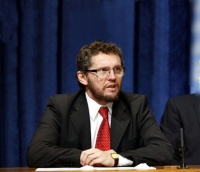Home » Kuwait » Press Releases » KWT - News » Kuwait: Alkarama Submits Shadow Report to Human Rights Committee Ahead of the Country’s Review
Grave restrictions to freedom of expression
In recent years, Alkarama has witnessed an alarming rise in repression to the freedom of opinion and expression in Kuwait and has documented and submitted to the UN Special Procedures a number of cases in which individuals were prosecuted for voicing their opinion and exercising their freedoms. Indeed, our organisation is concerned by the disturbing trend of prosecution for criticising the State or its institutions on the basis of the new Cybercrime Law of 2015 which reinforces the crackdown on activism online as well as the Communication Law of 2014 which curtails the freedom of the press; Alkarama has urged Kuwait to review these laws and repeal some provisions that are in clear contradiction with the ICCPR.
Another method used by the authorities to silence dissent is stripping political opponents of their nationality, rendering them effectively stateless and thus restricting the majority of their rights. Indeed, Kuwaiti legislation allows for the withdrawal of nationality by decree of the Minister of Interior if a person "has promoted principles that will undermine the social or economic system of the country" or "threatens the higher interests of the State or its security,"-decisions which cannot be appealed. Alkarama has called on the State to end this politically motivated practice of citizenship revocation and to return their citizenship to those who have been stripped of it.
Violent crackdown of peaceful assemblies
Alkarama also drew the attention of the Committee to the violations of freedom of peaceful assembly through the violent repression of protests and the arbitrary arrest and detention of peaceful demonstrators as well as the legal prohibition of public gatherings without prior official permission. The organisation further noted that non-Kuwaiti citizens are prohibited, by law, to participate to public gatherings. In its report, Alkarama recommended that the Kuwaiti authorities allow public gatherings and protests and refrain from any excessive use of force against peaceful protesters. Kuwait should also repeal all provisions restricting the right to freedom of peaceful assembly.
Discrimination of stateless "Bidoon"
Amongst a number of concerns raised, Alkarama highlighted the continuous discrimination against the Bidoon , a diverse group of people who were not given nationality at the time of independence and are considered as illegal residents. Their status effectively affects all of their political and civil rights since without a nationality, the Bidoon cannot leave the country, are unable to participate in elections, and face restrictions in employment, health care, education, marriage and family law. Their children are born stateless and are therefore subjected to the same restrictions. Furthermore, as illegal residents, the Bidoon are at permanent risk of deportation and are subjected to indefinite administrative detention in retention centres for non-Kuwaitis. Therefore, Alkarama recommended that Kuwait guarantee the right of every child to acquire nationality, end all discrimination against the Bidoon and guarantee to everyone residing in Kuwaiti territory equal access to education, healthcare, political rights and legal recognition.
For more information or an interview, please contact This email address is being protected from spambots. You need JavaScript enabled to view it. (Tel: +41 22 734 1008).
 Algeria
Algeria Bahrain
Bahrain Djibouti
Djibouti Egypt
Egypt Iraq
Iraq Palestine/Israel
Palestine/Israel Jordan
Jordan Kuwait
Kuwait Lebanon
Lebanon Libya
Libya Mauritania
Mauritania Morocco
Morocco Oman
Oman Qatar
Qatar Saudi Arabia
Saudi Arabia Sudan
Sudan Syria
Syria Tunisia
Tunisia United Arab Emirates
United Arab Emirates Yemen
Yemen Other Countries
Other Countries




